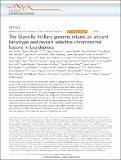The Glanville fritillary genome retains an ancient karyotype and reveals selective chromosomal fusions in Lepidoptera
Author(s)
Waterhouse, Robert M.
DownloadAhola-2014-Glanville Fritillary.pdf (1.010Mb)
PUBLISHER_CC
Publisher with Creative Commons License
Creative Commons Attribution
Terms of use
Metadata
Show full item recordAbstract
Previous studies have reported that chromosome synteny in Lepidoptera has been well conserved, yet the number of haploid chromosomes varies widely from 5 to 223. Here we report the genome (393 Mb) of the Glanville fritillary butterfly (Melitaea cinxia; Nymphalidae), a widely recognized model species in metapopulation biology and eco-evolutionary research, which has the putative ancestral karyotype of n=31. Using a phylogenetic analyses of Nymphalidae and of other Lepidoptera, combined with orthologue-level comparisons of chromosomes, we conclude that the ancestral lepidopteran karyotype has been n=31 for at least 140 My. We show that fusion chromosomes have retained the ancestral chromosome segments and very few rearrangements have occurred across the fusion sites. The same, shortest ancestral chromosomes have independently participated in fusion events in species with smaller karyotypes. The short chromosomes have higher rearrangement rate than long ones. These characteristics highlight distinctive features of the evolutionary dynamics of butterflies and moths.
Date issued
2014-09Department
Massachusetts Institute of Technology. Computer Science and Artificial Intelligence LaboratoryJournal
Nature Communications
Publisher
Nature Publishing Group
Citation
Ahola, Virpi, Rainer Lehtonen, Panu Somervuo, Leena Salmela, Patrik Koskinen, Pasi Rastas, Niko Valimaki, et al. “The Glanville Fritillary Genome Retains an Ancient Karyotype and Reveals Selective Chromosomal Fusions in Lepidoptera.” Nature Communications 5 (September 5, 2014): 4737.
Version: Final published version
ISSN
2041-1723